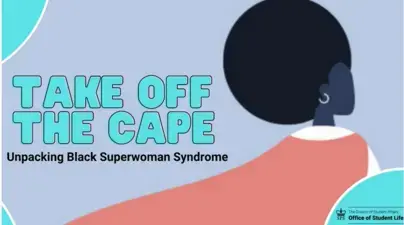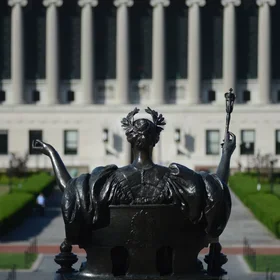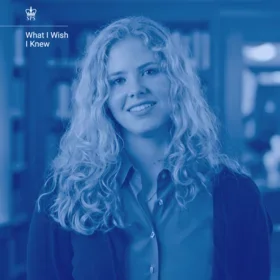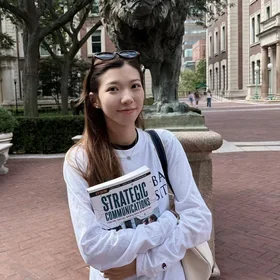Strategic Communication student and Columbia HBCU Fellow Kenya Cummins is on a mission to tell stories through film and sharpen her skills — all while building critical networks of support among Columbia students of color. In partnership with Student Affairs at Columbia SPS this Spring, she spearheaded the event, Take off the Cape: Unpacking Black Superwoman Syndrome, to promote wellness and allyship among women of color in the Columbia community. A self-described filmmaker, screenwriter, and content creator, Cummins will intern with MTV’s Original Series unit this summer and attend the American Film Institute as a Screenwriting Fellow in the fall. Here, she speaks about her experience at Columbia.
Why did you choose to pursue a Master’s degree in Strategic Communication, and why from Columbia, in particular?
It’s funny because I never really imagined myself applying for graduate school before my senior year of college. I had a friend who was applying to the Columbia HBCU Fellowship a year ahead of me and found out about it through him. I thought it would be an amazing opportunity to have the Ivy League experience and to further my knowledge overall. When I learned about the Fellowship, I was just amazed that Columbia had taken the initiative to actively engage and advance HBCU students. At one point, Columbia was one of my top choices for college, so I thought it might be an amazing full-circle moment.
Regarding Strategic Communication, I studied it at Hampton because I felt that it was the best way to develop as a storyteller. Hampton has a film program that’s growing—I was a cinema studies minor—but I thought that I could advance my knowledge and expertise at Columbia. I knew from my experiences as a content creator and filmmaker that being in New York would likely provide some opportunities to network and further my craft as well.
What have you appreciated the most about your Columbia HBCU Fellowship experience over the past year?
The community that I found among the Fellows means the most to me. The friends that I’ve made have already made such an impact on my life. Whether it’s walking to Insomnia Cookies when I found out I got into the American Film Institute, going for brunch or Central Park, or soaking up the sun at Rockaway Beach—it just means a lot to me to be able to come to an institution like Columbia and find community among people that are excellent, ambitious and also happen to look like me. It’s really special.
I’ve been able to take some phenomenal classes and meet professors that were willing to write letters for me for AFI in a short amount of time, which speaks to the way that we were able to connect. It’s been tremendous. And it really proves that if you lead with good intentions and love, you can make any situation as good as you possibly can, even in the middle of a pandemic.
Do you have a favorite professor or class at Columbia? Which professor or class and why?
I had the privilege of learning from many exceptional professors during my time at Columbia. One of the most notable was Dr. Visconti. During my first semester, I was a student in his Compelling Communicator course, where I learned about effective storytelling, persuasion, and speechwriting. What I appreciated immediately about Dr. Visconti, was how he actively engaged the class in unique ways by referencing interesting quotes, asking thoughtful questions, and acknowledging our individual contributions during class discussions. He was also happy to schedule meetings with me during his virtual office hours, which allowed me to get to know him better and also express my passion for film and entertainment. From then on, Dr. Visconti welcomed my suggestions/ additions to the course’s assignments that would allow me to include an emphasis on film. This allowed me to create a brief proposal for one of my original pilots and to present an original speech entitled “Stereotype or Strategy? The Keys to Liberating Black Hollywood.” Additionally, he was kind enough to write a recommendation on my behalf for the American Film Institute. His support of my journey as a student and a filmmaker made such an impact on my first semester at SPS.
What advice would you give to an incoming Columbia HBCU Fellow about using the resources and experts available to them?
The Career Design Lab equipped me with wonderful support and resources. I met with Briana McDonald, Onika Richards, and Barbara McGloin for advice and to discuss my progress in securing an internship. I created a spreadsheet outlining the roles I was pursuing and was connected to recruiters or affiliates of the corresponding companies. Additionally, the Career Design Lab hosted a number of professional events and workshops throughout the year to give us the opportunity to network, explore different career fields, and improve our professionalism. The HBCU Fellowship program also allowed me to connect with mentors Amber Micala Arnold and Alece Oxendine, who was introduced to me by a former HBCU Fellowship staff member. Both of them have contributed to my career development. Amber was kind enough to conduct a mock interview with me, a financial planning session, and share her career experiences. Incoming Columbia HBCU Fellows should strive to utilize these resources to supplement their academic and professional journey. I could summarize my recommendation in one statement: advocate for yourself. Identify your strengths and areas of growth so that you can set goals to improve. Familiarize yourself with resources offered by the Career Design Lab and build and maintain relationships with your advisors early on. Remember that while the Career Design Lab is there to help you, you should strive to actively seek opportunities independently.

This Spring you organized and moderated a student event, Take Off the Cape. Tell us more about how it went.
The purpose of Take Off the Cape was to create a space for Black women to talk about Black Superwoman Syndrome, which essentially encompasses society’s expectation for Black women to carry the weight of the world on their shoulders. Psychologist Jazz Keyes defined the phenomenon as: “...a self-created persona that Black women have adopted into their sense of being that promotes managing multiple roles of a worker, a homemaker, a volunteer, a student, or other such time-intensive occupations to support their sense of independence” (Black Press USA). I began to envision a safe space to share, dissect, and unpack the issue. Coming from an HBCU, I thought it would be beautiful to create a space at Columbia for Black women to have that opportunity to fellowship with one another, to express their feelings, and leave equipped with resources and tools to combat Black Superwoman Syndrome and its impact on the mind, body, and soul.
With support from Student Affairs, I was able to elevate this conversation in ways I could never have expected. We had an all-star panel: Jenny Fernandez, VP of Marketing at Loacker and Columbia SPS Lecturer; Nadea Mina, VP of Public Relations at Rubenstein and Owner of Nadea Mina PR; Dr. Keoshia Worthy, Licensed Psychologist at the Columbia University Irving Medical Center; Zelon Crawford, the Senior Associate Dean, Student Affairs at Columbia SPS; and Mydashia Hough, SPS Academic Advisor. Hopefully, this will open the door for similar events for all women of color because we all have had experiences with systematic and societal pressures. I was happy to bring this sense of community-building that I got from my HBCU to Columbia.
What’s next for you?
This summer, I’ll be interning at MTV on their Original Series team, which is very exciting. I will complete my final semester in August. Very shortly after that, I will travel to Los Angeles to attend the American Film Institute as a Screenwriting Fellow. Just saying that is surreal! God has sustained me through my journey at Columbia and beyond. I feel very blessed.


